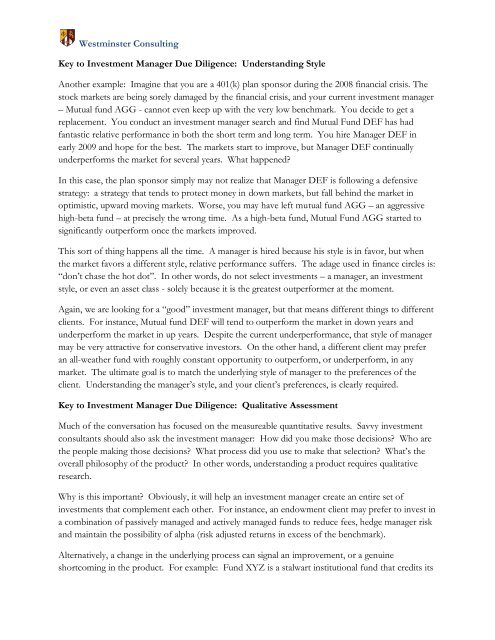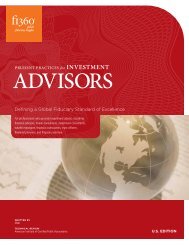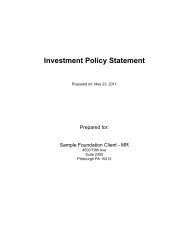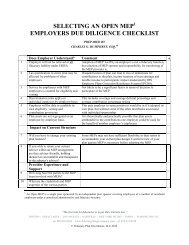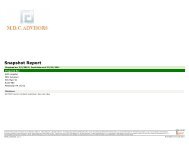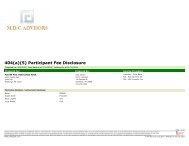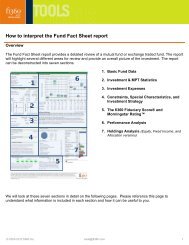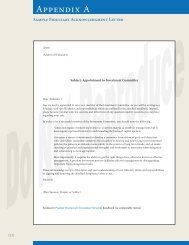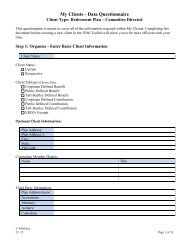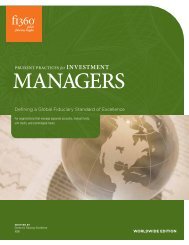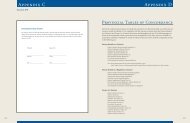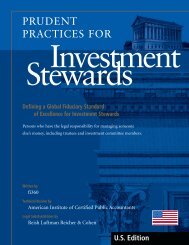and Investment Manager Due Diligence - Fi360
and Investment Manager Due Diligence - Fi360
and Investment Manager Due Diligence - Fi360
You also want an ePaper? Increase the reach of your titles
YUMPU automatically turns print PDFs into web optimized ePapers that Google loves.
Westminster Consulting<br />
Key to <strong>Investment</strong> <strong>Manager</strong> <strong>Due</strong> <strong>Diligence</strong>: Underst<strong>and</strong>ing Style<br />
Another example: Imagine that you are a 401(k) plan sponsor during the 2008 financial crisis. The<br />
stock markets are being sorely damaged by the financial crisis, <strong>and</strong> your current investment manager<br />
– Mutual fund AGG - cannot even keep up with the very low benchmark. You decide to get a<br />
replacement. You conduct an investment manager search <strong>and</strong> find Mutual Fund DEF has had<br />
fantastic relative performance in both the short term <strong>and</strong> long term. You hire <strong>Manager</strong> DEF in<br />
early 2009 <strong>and</strong> hope for the best. The markets start to improve, but <strong>Manager</strong> DEF continually<br />
underperforms the market for several years. What happened?<br />
In this case, the plan sponsor simply may not realize that <strong>Manager</strong> DEF is following a defensive<br />
strategy: a strategy that tends to protect money in down markets, but fall behind the market in<br />
optimistic, upward moving markets. Worse, you may have left mutual fund AGG – an aggressive<br />
high-beta fund – at precisely the wrong time. As a high-beta fund, Mutual Fund AGG started to<br />
significantly outperform once the markets improved.<br />
This sort of thing happens all the time. A manager is hired because his style is in favor, but when<br />
the market favors a different style, relative performance suffers. The adage used in finance circles is:<br />
“don’t chase the hot dot”. In other words, do not select investments – a manager, an investment<br />
style, or even an asset class - solely because it is the greatest outperformer at the moment.<br />
Again, we are looking for a “good” investment manager, but that means different things to different<br />
clients. For instance, Mutual fund DEF will tend to outperform the market in down years <strong>and</strong><br />
underperform the market in up years. Despite the current underperformance, that style of manager<br />
may be very attractive for conservative investors. On the other h<strong>and</strong>, a different client may prefer<br />
an all-weather fund with roughly constant opportunity to outperform, or underperform, in any<br />
market. The ultimate goal is to match the underlying style of manager to the preferences of the<br />
client. Underst<strong>and</strong>ing the manager’s style, <strong>and</strong> your client’s preferences, is clearly required.<br />
Key to <strong>Investment</strong> <strong>Manager</strong> <strong>Due</strong> <strong>Diligence</strong>: Qualitative Assessment<br />
Much of the conversation has focused on the measureable quantitative results. Savvy investment<br />
consultants should also ask the investment manager: How did you make those decisions? Who are<br />
the people making those decisions? What process did you use to make that selection? What’s the<br />
overall philosophy of the product? In other words, underst<strong>and</strong>ing a product requires qualitative<br />
research.<br />
Why is this important? Obviously, it will help an investment manager create an entire set of<br />
investments that complement each other. For instance, an endowment client may prefer to invest in<br />
a combination of passively managed <strong>and</strong> actively managed funds to reduce fees, hedge manager risk<br />
<strong>and</strong> maintain the possibility of alpha (risk adjusted returns in excess of the benchmark).<br />
Alternatively, a change in the underlying process can signal an improvement, or a genuine<br />
shortcoming in the product. For example: Fund XYZ is a stalwart institutional fund that credits its


